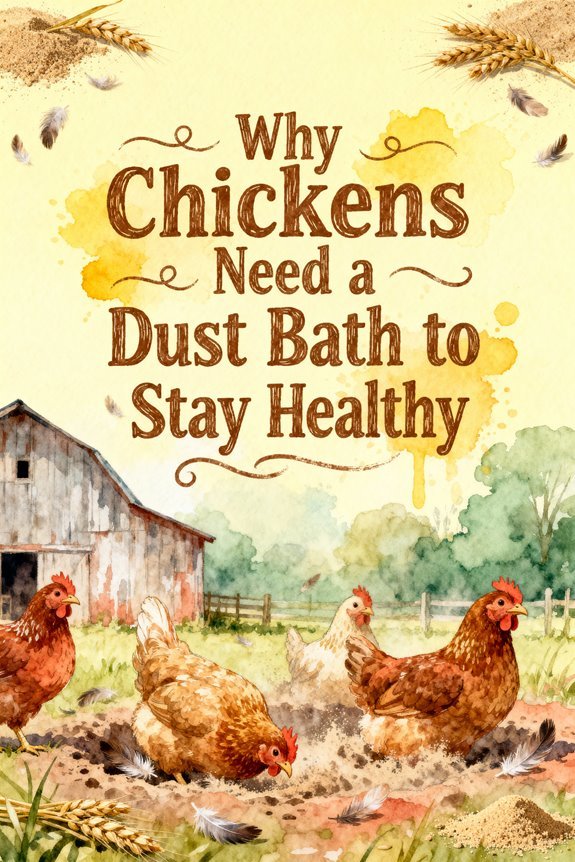Dust bathing is crucial for your chickens’ physical and mental well-being. It helps remove parasites like mites and lice while regulating oil production from their uropygial gland. The natural behavior allows birds to maintain proper feather condition, control body temperature, and reduce stress through social bonding. When chickens engage in this instinctive activity with materials like dry soil or diatomaceous earth, they’re practicing essential self-maintenance behaviors that support their overall health. Understanding these benefits can transform your flock’s care routine.
Natural Defense Against Parasites and Pests
While dust bathing is a natural behavior for chickens, it serves a critical function as their primary defense mechanism against external parasites and pests. When your chickens roll in loose, dry soil, they’re actively dislodging mites and lice from their feathers while creating an inhospitable environment for these parasites. Use only small amounts of DE in dust bath materials to protect both chickens and humans from respiratory issues.
You’ll find that effective additives can enhance your dust bath’s pest management capabilities. By incorporating materials like diatomaceous earth, sulfur dust, or wood ash, you’re providing your flock with additional protection against external parasites. These substances work by absorbing excess moisture and coating the birds’ feathers and skin, making it difficult for parasites to survive. Just as chickens need insoluble grit for proper digestion, they require dust baths for external health maintenance. This natural defense system is essential for maintaining your flock’s health and preventing infestations that could compromise their well-being. Regular dust bathing also promotes social interaction and bonding among chickens in the flock.
Physical Health and Feather Maintenance
Beyond protecting against parasites, dust bathing plays a fundamental role in maintaining chickens’ physical health and feather condition. The process helps regulate oil production from their uropygial gland while promoting feather durability through proper distribution of these natural oils. When chickens engage in dust bathing, they’re simultaneously performing essential skin exfoliation, removing dead cells and preventing harmful buildup under their feathers. Adding diatomaceous earth powder to dust baths provides extra protection against external parasites like mites and lice. Regular applications of food-grade DE help maintain long-term parasite control in dust bathing areas.
You’ll find that dust acts as a natural abrasive, loosening trapped debris while absorbing excess oils that could otherwise weigh down feathers. This maintenance directly supports your chickens’ thermoregulation abilities, as clean, well-structured feathers provide ideal insulation. The mechanical action of dust bathing also prevents feather matting and clumping, ensuring each feather maintains its structural integrity for effective protection against environmental elements. The natural instinctual behavior of dust bathing strengthens social bonds within the flock as chickens gather to participate in this communal activity.
Mental Well-being and Stress Relief
As chickens engage in dust bathing, they experience significant reductions in stress and anxiety levels, comparable to therapeutic spa treatments in humans. This natural behavioral expression allows your birds to release pent-up energy while promoting mental calmness and contentment. You’ll notice improved cognitive engagement as they interact with various dust bath materials, preventing boredom and destructive behaviors. The ritual-like behavior of scratching and throwing dust is an ancient inherited behavior that has persisted since their wild ancestors.
The social aspect of communal dust bathing strengthens flock dynamics and reduces stress hormones through group synchronization. When you provide appropriate dust bathing opportunities, you’re supporting your chickens’ psychological health by allowing them to express instinctual behaviors. Adding wood ash or calming herbs to the dust bath further enhances their mental well-being by soothing irritation and providing aromatic benefits that can decrease anxiety.
Social Bonding in the Flock
When chickens establish social bonds within their flock, they create intricate relationship networks that enhance both individual and group welfare. These bonds form through specific bonding behaviors like mutual preening and close foraging, which strengthen relationships between preferred companions. You’ll notice that flock dynamics are governed by a hierarchical structure, with roosters playing vital roles in maintaining order and protecting the group. Soft clucking sounds indicate the birds are content and thriving in their social environment.
Social grooming serves dual purposes: it helps distribute oils and remove parasites while reinforcing trust between individuals. The stability of these relationships relies on adequate space and free choice of companions. You’ll find that chickens can form meaningful connections not only with other chickens but also with their human caretakers, recognizing voices and responding to consistent positive interactions. Studies show chickens often display affectionate behaviors toward humans who raise them from birth. Supplementing their diet with alfalfa pellets promotes healthy social behaviors by providing essential nutrients that support immune function and overall vitality.
Temperature Control and Comfort
The intricate social behaviors of chickens extend to their physical comfort mechanisms, most notably through dust bathing rituals. When your chickens engage in dust bathing, they’re utilizing a sophisticated temperature regulation system. The process disperses heat through dust particles while removing excess oils and moisture from their feathers. Similar to how chickens should avoid butternut squash seeds in large quantities, moderation is key in dust bathing activities.
You’ll notice specific behavioral patterns as chickens use dust baths as one of their primary cooling methods, especially during warmer periods. Since they lack sweat glands, they rely on this activity to maintain their body temperature between 104-107°F. The dust bath’s effectiveness depends on the materials available – loose, dry soil, wood ash, or diatomaceous earth work best. While chickens might peck at nearby items during bathing, it’s important to ensure they avoid high salt foods that could harm them. These substances help your chickens dissipate heat while simultaneously cleaning and realigning their feathers for ideal insulation and temperature control. Regular dust bathing helps eliminate parasites like mites through natural grooming behaviors.






